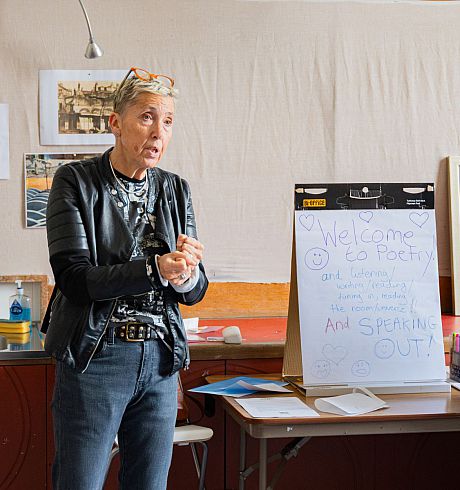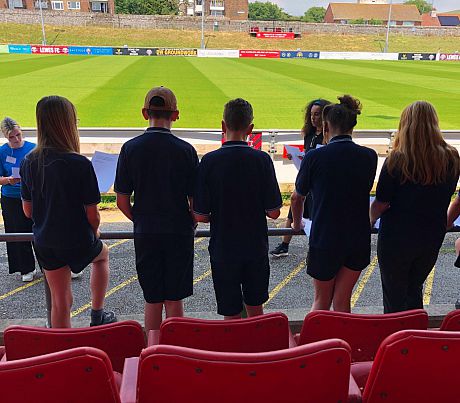Speaking Solidarity
Sparking poetic dialogue between poets from the LGBTQIA+ community and young people

Poet Maria Jastrzębska facilitating a workshop with members of the National Saturday Club, photograph taken by Chenying Cannell
Discrimination towards LGBTQIA+ teenagers is one of the most prevalent forms of bullying, according to reports in schools across the UK. These reports cite the widespread use of homophobic, biphobic, and transphobic language as a main concern. This has left members of the LGBTQIA+ community feeling isolated, under-confident, and without a voice.
‘Speaking Solidarity’ seeks to address this pressing issue by directing teenagers away from the use of spoken language as an instrument of hate and prejudice and towards engaging with language in new, inventive, and positive ways. Emerging from research on the importance of oracy in secondary school and university education, this project also draws on ideas of civic engagement, lyric pedagogy, and sound studies from across the University of Sussex. It aims to use spoken word poetry, which has its roots in oral tradition and performance, to access spoken language as a site of creative, playful, and thoughtful self-expression. This project seeks to give young people the tools to speak with confidence, tolerance, and compassion – with one another and with their wider community.

‘Poet Erin James chanting with young people from Priory School at Lewes FC, photograph taken by Katy Mack’
The project has been working closely with poets from the LGBTQIA+ community and local partners in cultural institutions and football clubs to deliver a series of poetry workshops for groups of teenagers in Greater Brighton at these local venues. These workshops have the dual intention of using poetry to hone participants’ listening and speaking skills whilst also making LGBTQIA+ narratives more accessible to local young people and the community at large.
The collaborative poetic responses generated from these workshops around themes of self-expression, identity, and belonging formed the basis of a sound installation and interactive poetry display, ‘Speaking Solidarity: Gentle Listening, Thoughtful Talking’, which was housed at Brighton Museum and Art Gallery from September to December 2024.
You can hear some of the young people's poetic responses via the SoundCloud player below. The transcripts are available to download [Word 36.69 KB].
Poetic responses:
‘I am the swimmer’ – Maria Jastrzębska
‘Take a leap’ – Willingdon Community School
‘Where do I belong?’ – The National Saturday Club
‘I am scared, but’ – Dorothy Stringer School
‘Lewes Football Club: Changing the Field’ – Erin James
‘People Power’ – Longhill High School
‘I Am Part Of A Team’ – Priory School
Project people:
Dr Katy Mack: Principal Investigator
Associated Faculty:
This project is sponsored by the Centre for the Study of Sexual Dissidence.
We also acknowledge and thank our funder, the Arts & Humanities Research Council (AHRC) Impact Acceleration Account (IAA).